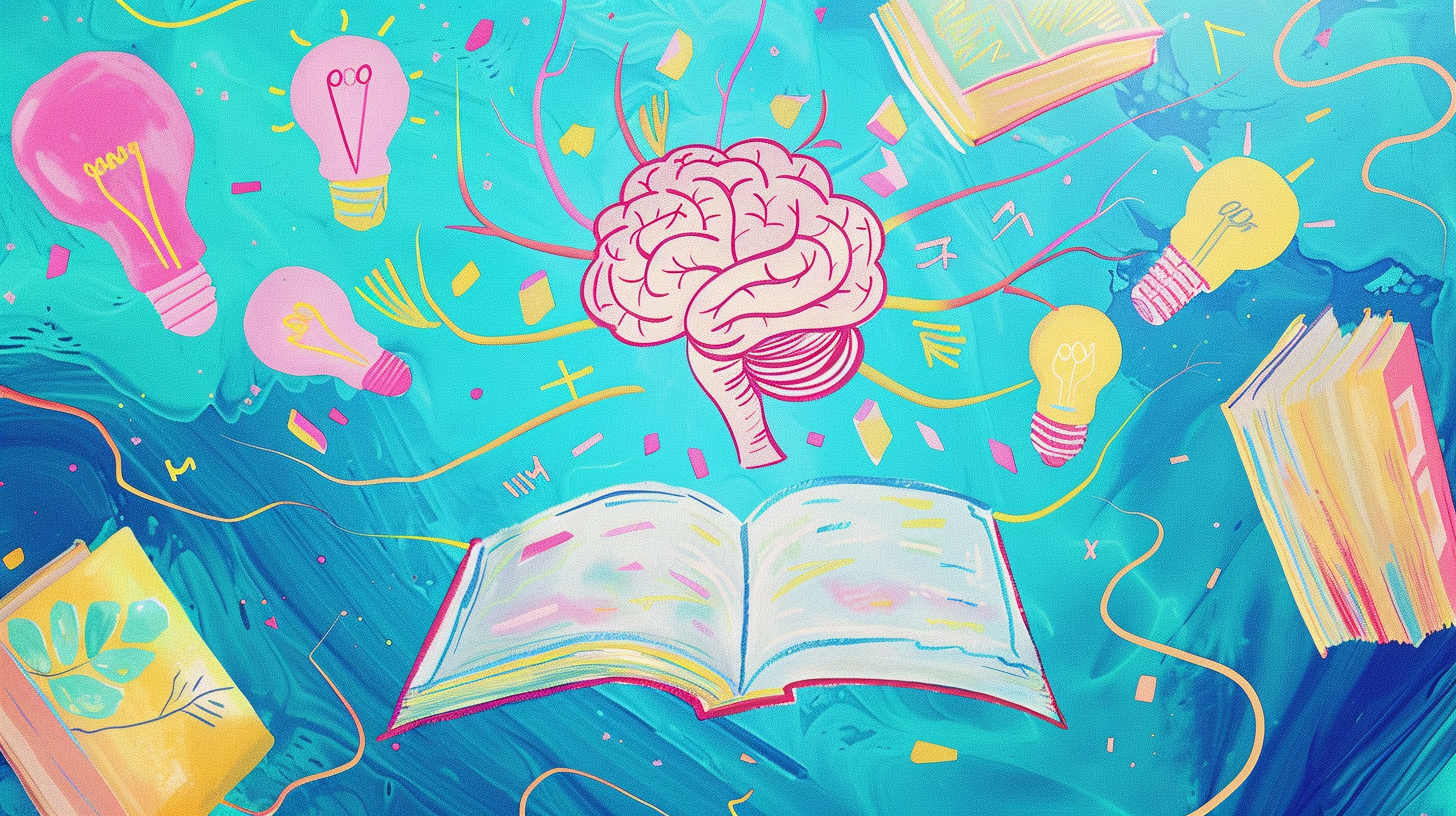The question of “does reading improve memory” leads us into the fascinating realm of cognitive science and literature’s role in enhancing our mental faculties. In an age where scrolling through social media often replaces deep reading, it’s worth exploring the impact that immersing yourself in a good book can have on your brain’s retention abilities.
In this text, we’ll jump into the benefits of reading, uncovering how it entertains and strengthens your memory. You’ll learn about the cognitive processes involved in reading and how they affect memory, the types of reading materials that are most beneficial for memory improvement, and strategies you can adopt to maximize memory enhancement while enjoying your favorite literature.
Benefits of Reading
Reading Enhances Memory
We all ask ourselves, does reading improve memory? The answer lies in the consistent cognitive engagement that reading offers. When you immerse yourself in a narrative, reading memory demands kick in—you’re tasked with absorbing and recalling character arcs, plot details, and thematic nuances. It’s this active retention challenge that means reading improves memory.
Also, the question of how does reading improve your memory can be understood through brain plasticity. Each session with an audiobook or text strengthens neural circuits associated with memory. Reading helps memory by boosting brain function in the hippocampus, which is crucial for forming new memories.
If you’re curious about whether does reading help your brain, there’s robust evidence indicating it does. Beyond the memory-boosting effects, reading is good for brain health because it increases your attention span and concentration. As you focus on the narrative and details, reading benefits brain functioning by enhancing these cognitive abilities.
Reading Improves Cognitive Function
In exploring how does reading improve cognitive function, it’s important to note that reading is like exercise for your mind. Engaging with complex narratives or informational texts demands a high level of cognitive function, including problem-solving and critical thinking.
For those wondering what does reading improve, aside from memory, know that it increases various aspects of brain power. The cognitive benefits of reading are diverse, from expanding vocabulary and knowledge to fostering empathy and imagination. This implies that reading helps the brain in more ways than one, making the activity a comprehensive tool for cognitive enhancement.
Research into does reading improve brain function reveals that this pastime is more than a mere hobby. Regularly consuming audiobooks entertains and improves processing speed, pattern recognition, and empathy—critical components of enhanced cognitive function. Consider the impact of audiobooks in this context; their convenience means you can easily integrate cognitive stimulation into your daily routines.
Whether you’re on a busy commute or doing household chores, answering the question of can reading improve memory or function becomes simpler. Audiobooks provide the brain-boosting benefits of traditional reading, often in a more streamlined, accessible format. With hands-free listening, keeping your mind active through reading has never been easier.
When pondering how does reading strengthen your brain, think about your last audiobook. Recalling chapters, analyzing storylines, and grasping complex characters mirror traditional reading benefits, potentially linked to improved cognitive reserve. This results in a strengthened mind, resilient against age-related decline.
How Reading Affects Memory
Reading Exercises the Brain
When you jump into a book or listen to an audiobook, you’re not just entertaining yourself but giving your brain a complete workout. Reading benefits the brain in myriad ways, mainly by sharpening memory. Like any muscle in your body that gets stronger with use, your brain’s memory centers experience a similar effect. Regular engagement with text or spoken words from audiobooks helps to stimulate the brain, which is crucial for memory retention. Reading activities involve complex processes involving vision, language comprehension, and associative learning, which all strengthen your brain.
Reading Increases Neuroplasticity
Neuroplasticity is the brain’s ability to reorganize itself by forming new neural connections throughout life. And guess what? Reading helps immensely with this. Whether you’re engrossed in a novel or soaking up a narrative via audiobook, your brain adapts and creates new pathways. This constant exercise leads to improved cognitive function — reading improves memory by aiding in forming new neurons. Hence, reading is good for the brain because it utilizes neuroplasticity to enhance mental flexibility and memory.
Reading Helps with Focus and Concentration
In today’s digital world, distractions are a constant. Yet, when you read or listen to an audiobook, your concentration levels improve. Pacing through plots and arguments forces you to focus and pay attention, thereby training your brain to block out distractions. Studies suggest that individuals who engage with reading material regularly display better attention spans and concentration over time.
Does reading improve concentration? Absolutely. It redirects your focus and quietens the mind, which is crucial for absorbing and recalling information. In short, reading, either traditionally or through audiobooks, helps your brain focus on details and understand contexts more efficiently, improving memory functions.
Types of Reading that Improve Memory
Fiction Books
Fiction Books not only entertain but also enhance memory. When you investigate complex narratives and character development, you’re challenging your brain to keep track of plots and people. This isn’t just amusement—it’s mental exercise. Fiction stimulates language centers, improves brain function, and increases empathy, both cognitive and emotional aspects integral to memory retention.
If you’re wondering, “Does reading fiction books improve memory?” the answer lies in your brain’s response to the material. Your neurons light up, creating new pathways—indicating that reading fiction is good for your brain and memory.
- Fiction offers complex storylines to follow.
- Engages your imagination.
- Stimulates emotional processing.
Reading fiction doesn’t just pass the time; it offers a cognitive workout that often surpasses passive activities. And if you’re thinking of how this activity can fit into your busy schedule, audiobooks hold the key. Imagine getting lost in a fantasy world while commuting or doing chores—audiobooks elevate your experience without demanding your full visual attention, allowing you to enjoy the narrative and memory-enhancing benefits simultaneously.
Non-Fiction Books
Reading non-fiction cultivates a different type of knowledge and memory engagement. This genre strengthens your intellectual capabilities and reading memory by exploring real-world concepts, facts, and theories. Whether it’s history, science, or self-help, non-fiction demands attention to detail and critical thinking—contributing to improved cognitive function and memory. – Builds knowledge on a wide range of topics
- Enhances understanding of complex concepts
- Informs decision-making processes
Non-fiction books can sometimes be demanding, necessitating high concentration levels. For those who find themselves multitasking, audiobooks again offer a practical solution. Listening to an impactful biography or a gritty historical account can be more engaging and less taxing than reading dense text, making it an ideal way to keep your mind active and absorb information—perfect for improving memory through reading.
Biographies and Autobiographies
Biographies and autobiographies connect readers with life stories that resonate on a human level. Reading about the challenges and triumphs of others can significantly affect memory by helping you understand different perspectives and recall life lessons learned. These stories can be a powerful way to strengthen your brain by exploring other’s experiences, emotions, and decisions. – Encourages reflection on personal experiences
- Relates to memory through real-life examples
- Provides diverse viewpoints and life lessons
Does reading biographies and autobiographies help with memory? Yes, as they require reflection and connection to one’s life, they naturally assist in retaining information. And when these stories are consumed through audiobooks, they gain an added layer of intimacy—often narrated by the author themselves—which can make the memory-boosting aspects even more profound.
Remember that listening can be as beneficial as reading—audiobooks genuinely hold their own in effective and efficient learning. By fitting audiobooks into your routine, you nourish your brain with stories and facts that entertain and enrich—providing a multifaceted approach to improve brain function, focus, and memory reading prowess.
Strategies to Maximize Memory Improvement while Reading
Take Notes While Reading
Taking notes isn’t just for the classroom; it’s a potent tool to enhance memory reading. Jotting down key themes and concepts helps reinforce the information in your brain. It’s a tactic that converts passive reading into an active process, solidifying comprehension. You’re more likely to remember what you’ve read by transforming reading into a physical action. When engaging with audiobooks, pause and record important points or benefit from apps that let you annotate digitally.
Engage in Active Reading
Active reading plays a crucial role when pondering whether reading helps with memory. It’s about fully immersing yourself in the content, questioning the material, making predictions, and summarizing points as you go. Engaging with the text prompts your brain to analyze and critique processes that are known to bolster the cognitive benefits of reading. With audiobooks, vocalize your questions and discussions or use playback features to review sections, enhancing your understanding and recall.
Use Visualization Techniques
Visualization is a powerhouse technique for memory reading, sparking life into narratives and concepts. Picture scenes, emotions, or the flow of an argument in vivid detail in your mind’s eye. This technique leverages your brain’s natural inclination for visual memory, tethering abstract text to concrete images. Incorporating visualization while listening to audiobooks can make the experience more immersive, turning passive listening into an active, imagination-rich encounter.
Conclusion
Embracing the habit of reading can significantly boost your memory, sharpening your mind for the challenges ahead. By incorporating strategies like note-taking, active engagement, and visualization, you’ll enjoy your reading sessions more and enhance your brain’s ability to retain information. Remember, it’s not just about flipping through pages; it’s about making each word count toward building a stronger, more resilient memory. So grab a book or hit play on an audiobook and transform your cognitive abilities today.
Frequently Asked Questions
How does taking notes while reading enhance memory?
Taking notes while reading engages active participation, helping to enhance memory by reinforcing the material through both the physical act of writing and the cognitive process of summarizing and paraphrasing the information.
Can visualization techniques improve memory when reading?
Visualization techniques can improve memory when reading by creating vivid mental images to accompany the text, making it easier to recall information and understand complex concepts.
Are audiobooks as effective as traditional reading for memory improvement?
Audiobooks can be as effective as traditional reading for memory improvement as long as the listener engages actively with the content, for instance, by taking notes or using visualization techniques to process and remember the information.
What are the long-term benefits of reading for the brain?
Long-term benefits of reading for the brain include enhanced brain connectivity, improved cognitive functions, heightened focus, and a reduced likelihood of neurodegenerative diseases like Alzheimer’s.
How does active reading contribute to improved memory?
Active reading involves questioning, analyzing, and critiquing the material as you read. This engagement forces your brain to process the information deeply, enhancing retention and enhancing memory.




